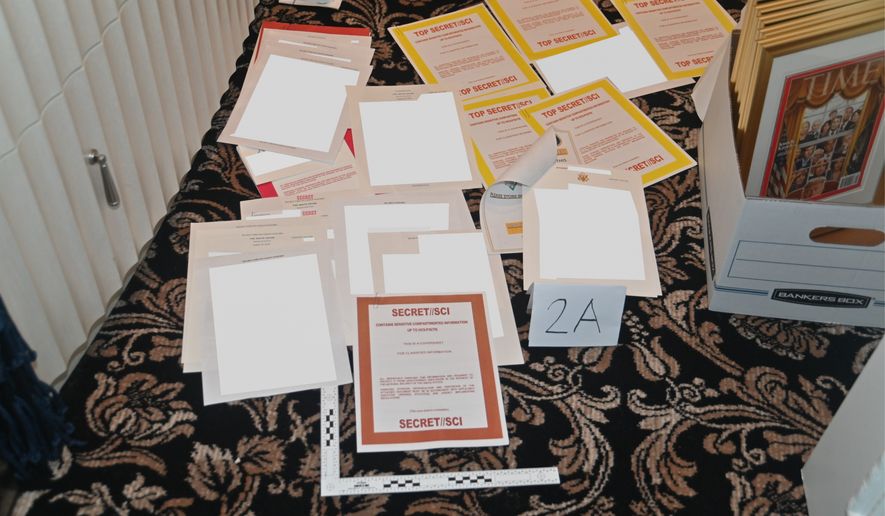The FBI raid on former President Donald Trump’s home turned up some top secret documents as well as empty folders with classified banners on them, according to a newly revealed inventory of seized items.
A federal judge on Friday unsealed the detailed inventory from the FBI’s Aug. 8 search of Trump’s office and residence at his private Mar-a-Lago club in Palm Beach, Florida.
Judge Aileen Cannon, who is considering Mr. Trump’s request for an independent “special master” to review the boxes of materials seized in the raid, ordered the release of the detailed property inventory during a court proceeding Thursday.
The newly unsealed inventory details 33 separate boxes and collections of documents seized during the search. Some of the items include mundane descriptions such as “Documents from Office” and “Book.”
The inventory lists hundreds of documents without classification markings, newspaper and magazine articles, photographs and items described by the FBI as “Article of Clothing/Gift Item.”
FBI agents also seized 43 empty folders with classification markings and 28 empty folders labeled “Return to Staff Secretary.”
But the inventory also lists several line items of U.S. government documents with classification markings ranging from confidential to top secret. The line items provide few details about what is contained in the documents.
The Justice Department said separately on Friday that it had segregated the classified material seized from the raid to ensure that it was being stored in accordance with proper protocol.
“The seized materials will continue to be used to further the government’s investigation, and the investigative team will continue to use and evaluate the seized materials as it takes further investigative steps, such as through additional witness interviews and grand jury practice,” the department said.
The majority of the items were seized in what is described as a storage room. Several boxes, including some containing classified documents, were seized from an office on the property.
Mr. Trump is under criminal investigation for violations of the Espionage Act and other federal crimes related to the mishandling or removal of classified government documents.
The unsealed inventory adds further details to the total scope of the FBI’s seizure following the Justice Department’s release of a photograph of classified documents seized during the search, including some marked “Top Secret/SCI,” a reference to sensitive compartmented information. The two designations are the federal government’s highest classification level.
Prior to the raid, Mr. Trump’s lawyers had said all presidential records sent to Mar-a-Lago from the White House during the waning days of his administration were secured in a storage room.
Attorneys for Mr. Trump also certified on June 3 that he had returned all of the documents covered under the subpoena, which sought all classified materials remaining at Mar-a-Lago.
Mr. Trump has insisted he declassified the documents and suggested that the FBI staged the photo to frame him.
In a motion filed on Wednesday, Mr. Trump’s lawyers said the Justice Department’s “unchecked investigators” can’t be trusted to conduct a fair investigation.
The jab at the federal prosecutors was part of Mr. Trump’s response to the DOJ’s argument against the request of an independent “special master” to review boxes of classified documents and other materials the FBI seized from Mr. Trump’s Florida home.
An FBI review team has already looked over the documents and concluded a “limited” number of the materials are protected by privilege. However, Mr. Trump’s lawyers said someone must oversee the FBI team’s work because the Justice Department can’t be trusted.
The Justice Department contends that Mr. Trump’s request for a special master was a delay tactic.
Judge Cannon has not yet ruled on Mr. Trump’s motion after holding a hearing on the matter Thursday.
• Joseph Clark can be reached at jclark@washingtontimes.com.




Please read our comment policy before commenting.